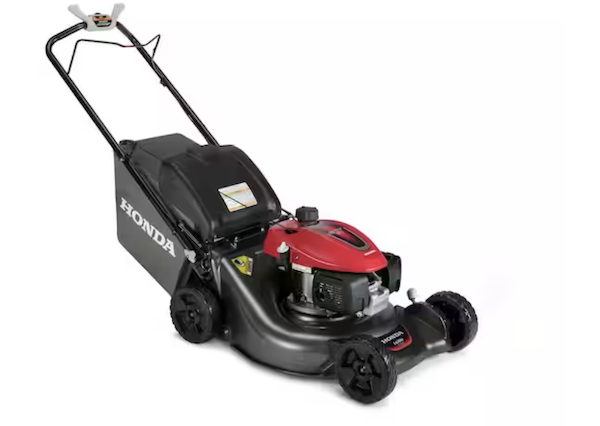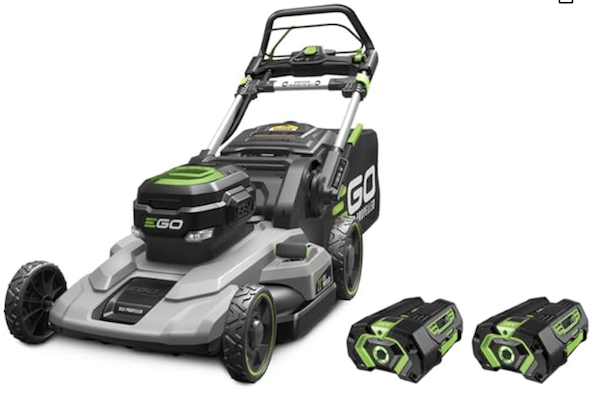We may earn revenue from the products available on this page and participate in affiliate programs. Learn More ›
If it’s time to replace your old lawn mower, then chances are you’re weighing the pros and cons of going with an electric or gas-powered model. Gas still offers the most grass-cutting power and longest runtimes, making this type of mower the clear choice for those with larger yards. But for most homeowners, cordless electric is the way to go. With advancements in battery technology, most cordless mowers have a runtime approaching an hour, ample time for mowing the average 1/4-acre yard on a single charge. Plus, they’re far easier on the environment, quieter, and easier to operate and maintain. Not sure whether gas or electric is the right mower for your yard? Ahead, we break down all the factors you need to consider when choosing between these two types of lawn mowers.
Types of Lawn Mowers

- Push mowers: Push mowers come in corded and cordless electric models and gas models. They have cutting decks that are about 20 inches wide and require you to provide the force to push them forward.
- Self-propelled: Self-propelled lawn mowers, which come in both electric and gas powered models, are just like their push mowers, only they have motorized wheels that pull them forward, so you don’t have to push them. They’re a great option for lawns with slopes, those who may physically struggle to push a mower, or those with larger yards to mow.
- Riding: Riding lawn mowers come in two varieties, lawn tractors and zero-turn mowers, both of which are designed to handle larger yards that span a 1/2 acre or more. Both types are available in gas-powered and cordless electric models.
Comparing Electric vs. Gas Lawn Mowers
When choosing between these two types of lawn mowers, it’s important to consider cost, run time, power, maintenance, and ease of use. We break down each of these factors below.
Cost
Cost ranges significantly depending on a lawn mower’s power source. Corded electric lawn mowers are by far the cheapest options out there, with most ranging from $150 to $200, depending on the brand and deck size.
Cordless models are pricier than corded models, with prices depending on the brand, deck size, and whether it’s self-propelled. A basic 20-inch walk-behind mower can range from around $300 to $700 with some self-propelled models with extra large decks running as high as $1,200, and batteries running $150 to $200. A battery-powered riding mower is significantly more expensive than walk-behind models, ranging from $4,000 for a lawn tractor up to $7,000 for a zero-turn riding mower, with batteries costing $150 to $400.
Gas mowers, which also come in a variety of sizes and types, also run the gamut when it comes to price. Except to pay between $300 and $800 for a walk-behind gas powered mower, again depending on brand, deck size, and whether it’s self-propelled. Some super high-end models with wide mowing decks can reach as high as $1,600. Gas riding mowers range from $2,000 for a small riding tractor up to $4,000 for a zero-turn riding mower.
Run Time
When considering whether a gas mower or electric or electric is better for you, keep in mind that gas-powered lawn mowers have the clear advantage when it comes to runtime. You’ll get between 30 and 60 minutes on a cordless, battery-powered lawn mower, depending on the size of the battery, the voltage of the mower’s engine, and how hard it has to work to cut through the grass. Thicker, taller grass requires more power and hence drains the battery more quickly. You’ll get about 45 to 60 minutes of run time out of one tank of fuel of a gas lawn mower.
The main difference with a corded lawn mower is that once the batteries are drained, you’ll need to wait for them to recharge before you can proceed, a process that can take 45 minutes to several hours. With a gas lawn mower, you can simply refill the tank and keep on mowing. For this reason, most battery-powered lawn mowers are limited to yards you can mow in less than an hour (which can vary depending on the size of the mower’s deck).
“Gas mowers are just going to last longer and can therefore handle a bigger mowing job with a larger yard than an electric mower might,” says Ryan Farley, CEO of Lawnstarter, a company that matches lawn care services with homeowners.
While corded electric mowers can run indefinitely, keep in mind that they’re limited in range and power. They’re only rated for extension cords up to 100 feet long, and the 120-volt outlet limits their deck size to a maximum of 20 inches.
Power and Cutting Ability
While there are some battery-powered mowers that can match gas in cutting power, on average, gas lawn mowers are more powerful and have greater cutting ability than cordless electric models. While most gas lawn mowers have the muscle to cut through even thicker grass, not all cordless electric lawn mowers do.
That said, advancements in battery technology have put some higher-end electric lawn mowers in the same league as gas powered models when it comes to toque. For example EGO, which makes some of the most powerful electric mowers, produces battery-powered push mowers that put out between 6 to 9 ft. lbs. of torque—on par with gas-powered mowers.
“Gas mowers do have a more powerful cut, so they can provide a higher quality cut when you’re working with denser grass, weeds, etc,” Farley says. “But for your average lawn, I haven’t really noticed too much of a difference.”
BV’s Top Gas and Electric Lawn Mowers
Best Gas Mower

Honda HRN216VKA 21″ Variable Speed Walk-Behind Mower, $549 at The Home Depot
This 21-inch lawnmower has a powerful, 170cc engine that sits atop an ample 21-inch deck. A simple clip system makes it easy to switch between mulching, bagging, and side discharge of grass clippings without needing to add or remove attachments. This Honda mower uses a rear-wheel drive for its propulsion system, which gives it superior ability to navigate uneven terrain and climb slopes. Handlebar controls make it a breeze to switch between the mower’s variable speeds.
See our researched guide to the best gas lawn mowers for more recommendations.
Best Electric Mower

Ego Power+ 21″ Self-Propelled Lawn Mower, $649 at Amazon
The Ego Power+’s 56V 7.5 amp-hour (Ah) battery produces up to an hour of runtime per charge and recharges within 60 minutes. Cutting power automatically increases when conditions get tougher; use a lever to adjust the self-propelled pace for optimum comfort. Choose from rear bagging, side discharge, or mulching with the included equipment.
See our tested guide to the best electric lawn mowers for more recommendations.
Maintenance and Winterization
When it comes to lawn mower maintenance and winterization, electric models have the clear advantage. Beyond storing the batteries indoors in times of extreme cold or heat and occasionally sharpening the blade, electric mowers require virtually no maintenance. Gas-powered mowers are another story. You’ll need to periodically replace its spark plugs, change its oil and oil filter, and clean its air filter to keep your lawn mower running smoothly. You’ll also need to winterize the gas to prevent it from going stale if you plan to store the mower for a long period of time.
Storage and Portability
Electric lawn mowers also have the edge when it comes to storage and portability. On average, gas mowers weigh 80 to 90 lbs. with an empty gas tank. Electric lawn mowers, in comparison, weigh 50 to 60 pounds, making them easier to maneuver and store. In fact, since electric lawn mowers don’t have a fuel tank, you can even store them vertically in your shed or garage to help save space.
Noise and Ease of Use

An electric lawn mower’s light weight makes it easier to maneuver and use than a heavier gas-powered lawn mower. Electric mowers are also easier to start. Whereas most gas mowers have a pull starter that requires the operator to have a certain amount of strength to fire up the engine, electric lawn mowers have push-button starters that make starting them effortless. If you struggle to start or push a mower, then an electric mower is the best choice when it comes to electric vs gasoline mower.
If your neighbors are sleeping in on Saturday morning, you won’t make any friends if you crank up your old gas-powered mower that emits around 95 decibels of racket—comparable to the sound of a motorcycle running.
Electric mowers (corded and battery operated) are much easier on the ears, producing between 65 to 75 decibels—similar to the sound of a washing machine running. “Electric mowers are known for making much less noise, so if you’re in pretty close quarters with a lot of neighbors, it can be courteous to spring for the quieter option,” Farley says.
Environmental Impact
Gas-powered lawn tools, including lawn mowers, release dangerous pollutants, including carbon monoxide, nitrogen oxide, and a host of volatile organic compounds, into the atmosphere. According to the Environmental Protection Agency, off-road gas-powered equipment, such as chainsaws and lawn mowers, emit about 242 million tons of pollutants each year, with mowers accounting for about 40% of those emissions.
Electric mowers, in comparison, have far less impact on the environment as both types of electric mowers create zero emissions. Rechargeable batteries for cordless mowers, however, do contain lithium, the mining of which has been known to pollute water supplies. If going green is your top priority, a corded electric mower is likely to have the least impact on the environment.
Keep in mind that depending on where you live, you may not have a choice between electric vs. gas lawn equipment. California banned the sale of gas lawn mowers beginning in 2024 as part of its Green Lawn Care Law. Cities such as Denver, Washington D.C., and Burlington, Vermont may soon follow suit.
Pros and Cons of Electric Lawn Mowers
| Pros | Cons |
| Produce no harmful emissions | Limited runtime of an hour or less |
| Lighter and easier to store and maneuver than gas mowers | Lack the cutting power of gas mowers with some exceptions |
| Low maintenance |
Best for:
- ¼-acre yards, or flat ½-acre yards with no obstructions
- Those who may have difficulty using a pull starter or pushing heavier equipment
- California residents and environmentally conscious homeowners
- Those looking for a low-maintenance mower
Pros and Cons of Gas Lawn Mowers
| Pros | Cons |
| Power to cut through dense grass | Emissions are harmful to the environment |
| Long runtime | Require routine maintenance and winterization |
Best for:
- Larger yards and 1/4-acre to 1/2-acre lawns with slopes and numerous obstacles
- Lawns with thick grass
Are Gas or Electric Lawn Mowers Better?

Whether you should go with a gas or electric lawn mower really depends on the type of yard you have. “Smaller or average-sized yards without dense spots or weeds will do great with an electric mower,” Farley says. Cordless mowers have enough runtime for you to mow the entire yard on a single charge, are lower maintenance, and are easier to operate and store. Electric lawn mowers are also by far the more environmentally conscious way to go.
That said, an electric lawn mower isn’t the best option for all lawns. If you have a lawn that’s larger than a 1/4 acre with slopes and various trees, landscaping beds and other obstacles to work around, you’ll likely need the longer runtime and raw cutting power that a gas mower offers. You may also want the superior cutting power offered by a gas mower if your lawn consists of thicker grass or if you like to let the grass grow longer between cuttings.
“Gas mowers come with the advantage of having a more powerful motor,” Farley says. “There’s also no need to charge a battery, and they can run for longer than an electric mower.”
If you’re looking for a budget option, have a small yard that’s less than an acre and don’t mind the inconvenience of a power cord, then a corded electric mower is a viable option.


